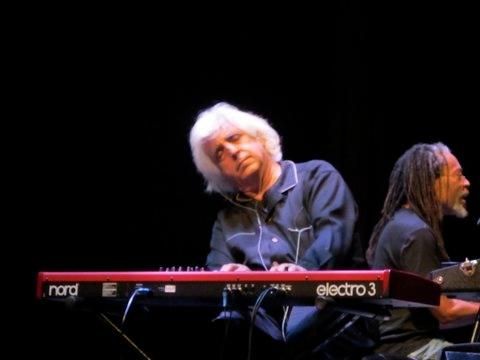Gil Goldstein and Bobby McFerrin’s New Project at the Kennedy Center
Gil Goldstein lends an experienced hand to Bobby McFerrin’s new concert series and recording project that honors familiar spirituals with a new spirit
/https://tf-cmsv2-smithsonianmag-media.s3.amazonaws.com/filer/20130513023031Goldstein_Thumb2.jpg)
In a career spanning nearly four decades, jazz artist Gil Goldstein’s talents have earned him kudos as educator, performer, composer, producer, arranger and film scorer. But perhaps his most notable role is as collaborator and mentor. Drawing on a formula of humility, curiosity and seemingly boundless creative energy, Goldstein’s collaborations have earned him worldwide recognition and the respect of A-list musicians exploring uncharted musical territory.
He has arranged for artists as diverse as Chris Botti, David Sanborn, Milton Nascimento, Randy Brecker, Manhattan Transfer and Al Jarreau, and performed with Pat Martino, Lee Konitz, Gil Evans, Billy Cobham, and Ray Barretto, among others. Film and TV music projects include performances, orchestrations and arrangements in ABC After School Specials, the films De-Lovely, Little Buddha, Frida, and dozens of others.
Not bad for a kid who got his musical start playing accordion in Baltimore, Maryland, where he recalls a TV show that had ”maybe 100 kids” featured on accordion. “When it was no longer hip, I said I’d better get rid of this thing,” he says explaining his move from accordion to piano and synthesizer. Still the accordion is a great instrument to learn to play music on, he says. “It’s always been part of my consciousness.”
Goldstein’s current collaboration is with ten-time Grammy-winning vocal innovator Bobby McFerrin. On May 13, the pair will perform at the Kennedy Center with Goldstein lending his talents as arranger and performer on piano and accordion to support McFerrin’s new Spirityouall, a concert series and recording project featuring some of the beloved spirituals he recalls from his youth.

McFerrin’s project also pays tribute to his father Robert McFerrin, Sr, the first African-American male to perform with the New York Metropolitan Opera, and the singing voice of Sidney Poitier’s Porgy in the film Porgy and Bess. Arranged and produced by Goldstein, the project is the kind of comfort zone stretching challenge that Goldstein relishes to expand his musical education and creativity and take him in new directions.
“I didn’t grow up with spirituals,” Goldstein says of his unfamiliarity with the music. While working on the project an encounter with jazz bassist Esperanza Spalding, who he’d collaborated with on her jazz chart busting CD, provided needed insight and inspiration. “She turned me onto an African American hymn book. It was perfect! I learned so much. I’m always learning.”
His respect for lifelong learning and the exchange that comes from “good” mentoring and collaborations are staples of Goldstein’s creative process. When he co-arranged and co-produced Spalding’s third CD, Chamber Music Society, neither knew it would become the best-selling contemporary jazz album of 2011, selling over 100,00 units, a rarity in modern jazz. They just knew they were creating something mutually satisfying and exciting.
Spalding went on to be named #1 in the Contemporary Jazz Artist Category that year and become the first jazz artist to win a Grammy in the Best New Artist Category, beating out pop idol Justin Bieber. It was her first Grammy win. (Spalding was also a recipient of Smithsonian magazine’s first annual Ingenuity Awards in 2012.)
“Esperanza had a concept for Chamber Music Society. I just enabled it,” says Goldstein. He connected her to the best string players and encouraged her artistic vision for a jazz/classical/world music music fusion album that incorporated the work of 18th-century poet William Blake. Supporting an artists’ vision ”is a kind of mentoring,” he says. ”That was one of those good ones, a win-win.”
A 2010 commission from the Schleswig-Holstein Musik Festival to commemorate the 200th anniversary of Frederic Chopin’s birth also sparked a collaboration with McFerrin. This time Goldstein adapted Chopin’s piano music to big band and McFerrin’s voice. Polish folk music that had influenced Chopin was added for zest along with compositions by Debussy and Brazilian composer Antonio Carlos Jobim, both artists inspired by Chopin.
The best mentoring and collaborative relationships are mutually beneficial, he says, a two-way street fueled by creativity and respect. As an accompanist, he says he strives for flexibility, leaving “space” for artists “to express themselves. That’s how I learned,” he says. “I was a terrible student who didn’t take well to someone telling me this is how you have to do it. I became an arranger by making it up, by being prepared to fail.”
That learning style might partly explain why his music education stretched out over five colleges. He spent two years at American University, one at Berklee College of Music, and another two at the University of Maryland, before receiving a BA in music. He then earned a masters in music at the University of Miami (where jazz guitarist Pat Metheny was a classmate) and a doctorate at The Union Graduate School.
Today Goldstein teaches at New York University, the Mead School for Human Development and the New School. He says he encourages his students to retain a healthy respect for and awe of musical elders that have been trailblazers. He credits guitar influences like Jim Hall and Pat Martino as inspirations, and remembers college classmate Metheny ”being very clear and humble about who his influences are. I think that’s a healthy thing to have a degree of respect for somebody. No one develops in a vacuum.”